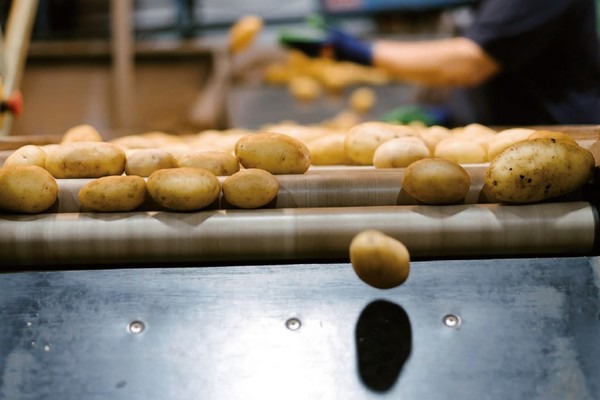The last of this year's storage potatoes from Bavarian cultivation are now circulating, marking the end of the season. Normally, the final batch of regional packaged goods hits the market by mid to late April, says Maximilian Hofbeck (r), Deputy Managing Director of the eponymous sorting and packaging plant in Dietenhofen, Franconia. "Quality-wise, the storage goods have held up quite well until the end of the season. Prices were largely stable in February and March, while there were several minor price increases between November and January."
Bavarian cultivation are now circulating, marking the end of the season. Normally, the final batch of regional packaged goods hits the market by mid to late April, says Maximilian Hofbeck (r), Deputy Managing Director of the eponymous sorting and packaging plant in Dietenhofen, Franconia. "Quality-wise, the storage goods have held up quite well until the end of the season. Prices were largely stable in February and March, while there were several minor price increases between November and January."
The packer and service provider for southern Germany's retail grocery sector also points to the challenges in cultivation, foremost among them the inflation-related cost increases, but also the more difficult growing conditions. "Climate change and pest pressure, combined with the trade's demands for appearance and quality, pose significant challenges for packers and producers, ultimately leading to higher waste than five to ten years ago. Additionally, due to the predominantly small-scale agriculture in Bavaria, the tubers are generally less uniform than in Northern Germany," adds Hofbeck.
As the regional season winds down, the supply of imported goods is gradually picking up. Hofbeck: "In the area of early potatoes, we are currently mainly packaging Egyptian early potatoes for consumption. So far, quality is very good, though quantities are not overly abundant. However, we are just at the beginning, so we cannot yet accurately assess the total volume." By the end of the month, the first early potatoes from Israel should also be delivered. "The war situation has once again shown us that in the packaging sector, we continue to rely on both origins. Due to the war, there is a shortage of personnel for sorting in Israel, which is reflected in the size sorting of the goods. There is a lack of small potatoes, as these were not removed from the raw material stream in Israel." Nevertheless, Israeli goods are generally more visually appealing than Egyptian ones due to soil conditions, making them five to ten euros more expensive per 100 kilograms.

Approximately 90 percent of the potatoes and onions washed, sorted, and packaged in Dietenhofen are ultimately delivered to the retail grocery sector. In addition, the nearby Nuremberg wholesale market is supplied. The company's site at the wholesale market was given up a few years ago.
Expansion of the area for red onions expected
Similar to potatoes, the Bavarian onion industry is now also nearing the end of its season. Subsequently, either goods from Northern Germany or overseas, whether from Oceania (Tasmania and New Zealand) or South Africa, will be used. Hofbeck. "In the fall, traditionally the weaker batches are brought to market, but this year, regional procurement posed an even greater challenge than usual due to the wetness and increased quality problems. At the start of the season, it looked as if there were enough potatoes and too few onions. This completely changed at the turn of the year: That is, in recent weeks, potatoes have become rather tight, while onions are plentiful."
In addition to yellow onions, Hofbeck's company also focuses on the procurement and marketing of red onions. "Unlike yellow onions, red onions, both from Bavarian and non-regional origins, are scarce and expensive this year. However, supply and demand change from year to year. Assuming there is enough seed available, the possibility exists that, due to the attractive prices, the cultivation area for red onions may be expanded again in the coming season, which could lead to larger supply quantities," Hofbeck concludes.
Images: Fritz Hofbeck GmbH
For more information:
Maximilian Hofbeck
Fritz Hofbeck GmbH 
Sorting and Packaging Plant
Seubersdorf 32
90599 Dietenhofen
Tel. 09105-997917
E-Mail: info@fritzhofbeck.de
www.fritzhofbeck.de
